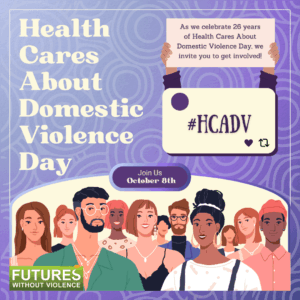How Community Health Centers Can Address Domestic Violence

October 8th is Health Cares About Domestic Violence Day. Register by October 8th at midnight for Building Health Center Responses to Domestic Violence (a 4-session Community of Practice), and join us on Wednesday, October 8th (8am HST/11am PST/12pm MST/1pm CST/2pm EST) for a Health Cares About Domestic Violence Day webinar!
A new patient dropped into my health center complaining of painful urination. While waiting for her urinalysis results during the visit, I obtained her “history of present illness”, and talked to her about healthy and unhealthy relationships, how relationships can impact health – sometimes leading to symptoms like hers. I offered her safety cards with information on how to get help (both locally and nationally) if she or someone she knew were ever in a situation where a relationship caused health harm (physical, emotional, psychological) or if there were any safety concerns.
She looked me straight in the eye, and replied, “Wow, thank you. This is not going on for me right now…but I wish I had this information a few years ago when I really needed it, and was in a really bad relationship… I’m going to take these because I have some friends who I think are experiencing the same thing.”
Why Community Health Centers should treat domestic violence as a health issue
Domestic violence is a health issue. Community Health Centers are primed to help patients by reducing isolation and improving outcomes for safety and health.
In a 2021 survey of National Domestic Violence Hotline callers, 61% noted that they had current health needs related to abuse, 41% were somewhat or extremely likely to be comfortable sharing their abuse experience with a health care provider, and 53% reported that an abusing partner had controlled or restricted their health care access.
Resources to learn more
Health Partners on IPV + Exploitation (Futures Without Violence), a National Technical Assistance Program, offers free resources to health center staff to effectively prevent and help your patients experiencing domestic violence. Examples of these resources include safety card tools, smart tools for OCHIN Epic and eClinicalWorks platforms; and health IT resources that explore customization, privacy, and confidentiality.
Stay connected to Health Partners on IPV + Exploitation for webinars, new resources, and other opportunities, by scrolling to the bottom of www.healthpartnersipve.org and signing up for the monthly newsletter, Catalyst for Change.
Building trust with patients to support overall health
That day, in addition to a prescription for a course of antibiotics, this patient left my health center knowing that she could talk to us about domestic violence, we could treat any health and mental health concerns, and we could help connect her to other community partners. We built her trust for future interactions with the health care system, and got crucial information into her hands and out into the community overall. Let’s show our patients and communities that Health Cares About Domestic Violence!
We encourage and invite you to participate in the 26th Annual Health Cares About Domestic Violence (HCADV) Day! Check out the HCADV Day action kit for ideas on activities you can organize in honor of HCADV Day this year and beyond.
Lead Author:
- Kimberly S.G. Chang, MD, MPH is a Family Physician at Asian Health Services, and is the current Speaker of the House for NACHC
Contributing Authors:
- Anna Marjavi is the Director of Health Partners on IPV +Exploitation
- Kenede Pratt-McCloud is a Program Assistant at Futures Without Violence on the Health Team
- Jake Sese, MPH is a Program Associate for Futures Without Violence on the Health Team